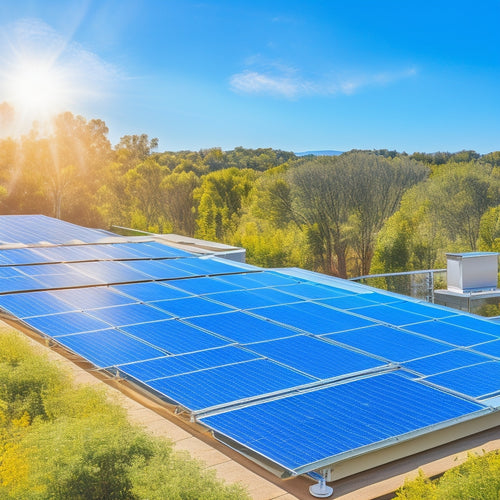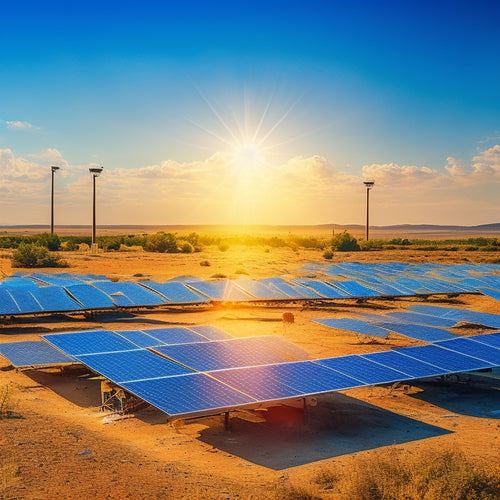
Advantages of Solar Roof Panels
Share
Solar roof panels provide you with significant advantages, including substantial cost savings on energy bills, which can be as high as 50%. By taking advantage of federal tax credits and local incentives, your initial investment becomes more manageable. Furthermore, they enhance your home's value and contribute to a cleaner environment by reducing carbon emissions. You'll also gain energy independence, generating your own clean power while protecting against rising energy costs. With long-term financial and ecological benefits, solar panels are a smart choice for any homeowner. Investigate how these advantages can benefit you further.
At a Glance
- Solar roof panels can reduce energy bills by up to 50%, providing significant long-term cost savings for homeowners.
- Homeowners can benefit from tax credits and rebates, offsetting the initial installation costs of solar panels.
- Solar energy production decreases reliance on fossil fuels, contributing to a cleaner environment and reduced carbon emissions.
- Investing in solar panels increases home value by an average of 3-4%, enhancing financial returns upon resale.
- Solar technology allows for energy independence, enabling homeowners to manage their own energy production and costs effectively.
Cost-Effective Energy Solution
Switching to solar roof panels can considerably reduce your energy bills, allowing you to allocate those savings elsewhere.
With advancements in solar technology continuously improving energy conversion rates, the initial investment pays off even faster, leading to impressive long-term savings that enhance your financial stability.
Reduced Energy Bills
Investing in solar roof panels can greatly lower your energy bills, making it a smart choice for homeowners looking to cut costs. By utilizing the power of the sun, you can greatly enhance your home's energy efficiency. This means you're not only reducing your reliance on traditional energy sources but also taking control of your energy consumption.
The financial incentives available for solar energy systems can further sweeten the deal. Many states offer tax credits, rebates, and other programs designed to make the shift to solar more affordable. These incentives can help offset the initial investment, allowing you to start saving sooner.
Moreover, with rising energy prices, having solar panels allows you to lock in your energy costs. Instead of being at the mercy of fluctuating utility rates, you can enjoy predictable energy expenses.
This financial freedom enables you to allocate your hard-earned money elsewhere, enhancing your overall quality of life.
Long-Term Savings Potential
When it comes to long-term savings, solar roof panels stand out as a cost-effective energy solution that can pay off greatly over time. By utilizing the sun's power, you can notably cut your energy costs and invest that money elsewhere.
Consider the following table that highlights potential savings:
| Category | Potential Savings |
|---|---|
| Energy Bills Reduction | Up to 50% |
| Federal Tax Credit | 26% of installation cost |
| Installation Incentives | Varies by state |
| Financing Options | Low-interest loans |
| Increased Home Value | 3-4% on average |
With various financing options available, you can install solar panels without a hefty upfront cost. Many states offer installation incentives, making your investment even more attractive. These incentives can greatly reduce your overall expenses, allowing you to reap the benefits sooner.
Environmental Impact Reduction
When you choose solar roof panels, you greatly lower your carbon emissions, contributing to a cleaner atmosphere.
This sustainable energy source not only reduces your reliance on fossil fuels but also promotes a healthier planet for future generations.
By investing in solar technology, you're actively participating in the fight against climate change and taking advantage of financial incentives that encourage the adoption of renewable energy solutions.
Additionally, community solar initiatives play an essential role in reducing the overall carbon footprint, further enhancing the positive environmental impact of solar energy.
Lower Carbon Emissions
Utilizing the power of solar roof panels greatly reduces carbon emissions, making a tangible impact on the environment. By utilizing renewable resources, you can greatly shrink your carbon footprint.
Traditional energy sources emit greenhouse gases, contributing to climate change; however, solar technology allows you to produce clean energy right from your rooftop. This shift not only supports sustainable practices but also enhances your energy independence.
When you integrate solar panels, you're investing in a future that prioritizes lower emissions and cleaner air.
The grid integration of solar energy systems allows for more efficient energy distribution, while energy storage solutions guarantee you can tap into this renewable energy even when the sun isn't shining. This means you can maintain a consistent energy supply while minimizing reliance on fossil fuels.
Sustainable Energy Source
Solar roof panels stand out as a sustainable energy source that greatly reduces environmental impact. By utilizing the power of the sun, you tap into renewable resources that not only minimize reliance on fossil fuels but also promote energy independence. This shift not only benefits your wallet but also the planet.
| Aspect | Impact |
|---|---|
| Carbon Footprint | Significant reduction |
| Energy Costs | Lower monthly expenses |
| Resource Depletion | Minimizes fossil fuel use |
| Energy Security | Increases self-sufficiency |
Opting for solar energy means you're playing an essential role in reducing greenhouse gas emissions, which are a leading cause of climate change. Additionally, you're contributing to a cleaner, healthier environment for future generations. By choosing solar roof panels, you're not just investing in your home; you're embracing a lifestyle that champions sustainability and freedom from fluctuating energy prices.
When you decide to go solar, you're taking a stand for energy independence and a more sustainable future, making a positive impact on the environment while enjoying the benefits of renewable energy.
Key Benefits of Solar Panels
When you consider solar panels, you're not just investing in a technology; you're looking at significant cost savings over time.
By capturing the sun's energy, you can reduce your electricity bills and contribute to a cleaner environment.
Additionally, integrating home battery storage systems can optimize your energy management and further enhance savings by allowing you to employ stored energy during peak hours explore financing options.
It's a win-win that can enhance both your financial and ecological footprint.
Cost Savings Over Time
Over time, investing in solar roof panels can lead to significant cost savings for homeowners. By taking advantage of installation incentives and tax credits, you can drastically reduce your initial investment. Financing options make it easier to manage upfront costs, allowing you to pay over time while still reaping the benefits of lower energy bills.
With solar panels, you gain energy independence, shielding yourself from rising utility rates. The durability of modern solar systems means you won't face high maintenance costs, as most panels require minimal upkeep.
Plus, you can choose panels that are compatible with your roof's design, ensuring that your home maintains its aesthetic appeal. Performance monitoring systems allow you to track energy production and savings in real-time, enabling you to make informed decisions about your energy use.
Don't forget to evaluate local regulations, as they can influence installation costs and potential savings. By understanding these factors, you can make a strategic choice that not only enhances your financial freedom but also positions you for long-term savings.
Investing in solar roof panels isn't just about immediate benefits; it's a step toward a more sustainable and economically advantageous future.
Environmental Impact Reduction
Investing in solar roof panels not only brings financial benefits but also greatly contributes to reducing your environmental impact. By utilizing the sun's energy, you're markedly lowering your reliance on fossil fuels, which are major contributors to greenhouse gas emissions. This shift is essential for promoting environmental sustainability and combating climate change.
Moreover, solar panels have a long lifespan, typically lasting 25 years or more. At the end of their lifecycle, you can take advantage of solar panel recycling programs, ensuring that beneficial materials are repurposed rather than ending up in landfills. This helps minimize waste and further supports a circular economy, enhancing your commitment to sustainable living.
You're not just making a choice for your energy needs; you're joining a movement towards a cleaner, healthier planet. By installing solar roof panels, you're taking a proactive step in reducing your carbon footprint and promoting a sustainable future.
This freedom from conventional energy sources allows you to live with purpose, knowing that your choices contribute to the well-being of the environment. Adopt this path toward environmental impact reduction—your actions today can inspire change for generations to come.
Selecting Based on Energy Output
When selecting solar roof panels, understanding energy efficiency ratings is essential for maximizing your investment.
Evaluating different key considerations for selecting solar battery systems can help you identify the best panels for your needs.
You'll want to size your system based on your specific energy needs to guarantee peak performance.
Energy Efficiency Ratings
Choosing the right solar roof panels hinges on understanding their energy efficiency ratings, which directly reflect their output potential. When you invest in solar panel technology, it's essential to prioritize ratings that indicate how effectively a panel converts sunlight into usable energy. Higher efficiency ratings can lead to significant energy efficiency improvements, maximizing your return on investment.
Here's a quick overview of common energy efficiency ratings:
| Panel Type | Efficiency (%) | Output Potential (kW) |
|---|---|---|
| Monocrystalline | 15-22 | 300-400 |
| Polycrystalline | 13-16 | 250-350 |
| Thin-Film | 10-12 | 200-300 |
| Bifacial | 17-25 | 350-450 |
Sizing for Needs
To effectively size solar roof panels for your energy needs, it's crucial to assess your household's energy consumption patterns.
Start by conducting an energy consumption analysis to determine how much electricity you use over a year. Look at your utility bills to identify peak usage months and factor in any future changes, like adding appliances or electric vehicles.
Once you've gathered this information, you can move on to solar panel sizing. This involves calculating how much energy your solar panels need to produce to cover your consumption, considering factors like local sunlight availability and panel efficiency.
The right size system not only meets your energy needs but also maximizes your investment in solar technology. A well-sized system can lead to substantial savings on your electric bills, giving you the freedom to allocate funds elsewhere.
Remember that oversizing can lead to unnecessary costs, while undersizing mightn't provide enough power.
Higher Long-Term Savings Potential
When you invest in solar roof panels, you're setting yourself up for markedly reduced energy bills over time.
As you generate your own electricity, you'll rely less on your utility provider, leading to substantial savings.
This shift not only eases your monthly expenses but also enhances your financial stability in the long run.
Reduced Energy Bills
Significant savings on energy bills can be one of the most convincing reasons to invest in solar roof panels. By utilizing the power of the sun, you can drastically reduce your reliance on the grid, moving toward energy independence.
Imagine producing your own electricity and watching your monthly utility bills shrink. This shift not only enables you but also protects you from fluctuating energy prices.
Many utility companies offer incentives for homeowners who switch to solar energy, further boosting your savings potential. These utility incentives can help offset the initial installation costs, making solar roof panels an even more attractive option.
Over time, the return on this investment can be substantial, allowing you to allocate funds towards things that truly matter—like travel, hobbies, or saving for the future.
Choosing solar panels isn't just about cutting costs; it's about embracing a lifestyle of self-sufficiency. By reducing your energy bills, you're not just saving money; you're reclaiming your freedom from rising utility costs and environmental concerns.
In the long run, the financial benefits coupled with the sense of independence create a persuasive case for making the switch to solar energy.
Frequently Asked Questions
How Do Solar Roof Panels Affect Property Value?
Solar roof panels can enhance your property appraisal by increasing its market appeal. Energy savings also attract buyers, showing them long-term financial benefits. Investing in solar not only enhances your home but supports your financial freedom.
What Maintenance Do Solar Panels Require?
Imagine your solar panels as guardians of sunlight. They need occasional cleaning techniques to remove debris and performance monitoring to guarantee efficiency. With minimal maintenance, you'll keep your energy freedom shining brightly for years to come.
Can Solar Panels Work in Cloudy Climates?
Yes, solar panels can work in cloudy climates, though solar efficiency may decrease. They still produce energy, capturing diffuse sunlight. Investing in quality panels guarantees you maximize energy production, even when the sun's not shining brightly.
Are There Incentives for Installing Solar Roof Panels?
Imagine slashing your energy bills while enjoying a tax break. You'll find federal tax credits and state rebates available, making solar roof panels a smart financial move that enhances your freedom to choose clean energy.
What Is the Lifespan of Solar Roof Panels?
Solar roof panels typically last 25 to 30 years, thanks to advanced solar panel technology. Their durability guarantees you won't have to replace them often, allowing you to enjoy energy independence without constant maintenance worries.
Explore More
Incorporating solar roof panels is like planting a tree that bears fruit for years to come. Not only do you cut down on energy costs, but you also contribute to a healthier planet. By choosing solar, you're investing in your future—enjoying significant long-term savings while reducing your carbon footprint. The benefits are clear, and as the sun rises, so does your potential for savings and sustainability. Adopt this energy solution and watch your savings grow.
Related Posts
-

What Types of Solar Energy Devices Are Available
You'll find several types of solar energy devices available today, each customized to different energy needs. Photovo...
-

What Happens Without a Charge Controller in Solar Panels
Without a charge controller in your solar panel system, you risk overheating batteries due to overcharging, which can...
-

Why Outdoor Solar Lighting Systems Are Sustainable
Outdoor solar lighting systems are sustainable because they utilize renewable energy, drastically reducing your carbo...


